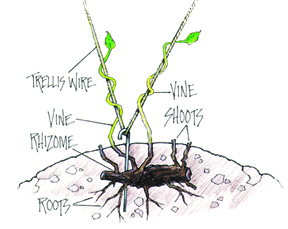March-April 2005
Article
Offbeat Homebrew Recipes
Sure, we can tell you how to make a straight up pale ale. But, we also feature some homebrews from the weird side. Here are 10 strange brews from our first 10 years.
Recipe
North Coast Brewing Co.’s Blue Star Wheat Beer clone
One of North Coast’s brewery’s summer lawnmower beers. With just enough hop presence and nice body thanks to a healthy heap of wheat malt.
Recipe
Pumpkin Beer
By modern standards, a pumpkin ale would hardly be considered that wild. But, it was the wildest recipe of 1995 (BYO’s first year). The biggest key to brewing this beer is getting the spice blend right. If you use “supermarket spices,” these amounts should yield a subtly spicy beer.
Decrease the amount if you grind your own whole spices.
Recipe
Spruce Bock
Here’s a hearty holiday beer with an unusual spice — evergreen needles. Spruce tips, the new-growth of spruce trees, give a unique, characteristic flavor to beer. This flavor is not “piney,” as many people suppose. Spruce tips can be found through an internet search. For best results, age your beer several months before sampling it.
Recipe
Smoked Maple Amber Ale
An American-style Amber Ale, with maple sap and syrup. Maple sap is the clear liquid that maple syrup is made from. In this recipe, maple sap replaces your brewing liquor. Maple sap contains 2.5% sugar on average. (In contrast, maple syrup contains around 66% sugar.) If you don’t have access to maple sap, use water and add an extra 1.66 pints of maple syrup during the boil. The amount of German smoked malt called for will only yield the faintest whiff of smoke. For a stronger smoked flavor, try replacing it with some home-smoked malt (we’d try hickory smoke.
Recipe
Original Hempen Ale
An American-style Ale with roasted hemp seeds. Steve Nordahl, former head brewer at Frederick Brewing Company and the originator of this commercial Hempen Ale told the story of how his hemp beer came to be in a 1999 article for BYO. Hempen Ale was originally meant to be a dark beer, with the flavor of roasted hemp seeds playing a large role in the flavor profile of the beer. Note: In the US, it is legal to possess (and brew with) sterilized hemp seeds. (An internet search will reveal multiple sources for the seeds.) These seeds contain only a trace of THC (the active ingredient
in marijuana) and have no psychoactive effects. However, it is possible that consuming hemp beer may cause you to test positive on some modern drug tests. Use your best judgement of your situation when brewing this beer.
Recipe
Eye in the Pyramid Wild Rice Helles Bock
A Helles Bock made with rice… How is that wild? Helles is German for "bright," so this is a bright or light colored bock.
– Adapted from Wild Wild Rice by Joe and Dennis Fisher.
Recipe
Stonehenge Stein Beer
When you wish for new brewing gear, do you ever wish for metamorphic rocks? You might after seeing this recipe. Here’s a recipe for steinbier — a beer whose wort is heated by hot stones.
Recipe
Mountain Brew
Jason Pavento wanted to combine his two favorite beverages, homebrew and Mountain Dew. His creation — Mountain Brew — does just that. We’ve fiddled with his procedures a bit, based on our own experimentation, but the ingredients are the same as his original recipe. The beer turns out light and crisp, with some aroma, but not much flavor from the Mountain Dew. And, in case you’re wondering, neither the preservatives or the caffeine seem to bother the yeast. Mountain Brew is also a very easy to make. So, to mangle a phrase from their ads — just brew it!
Recipe
Jolly Rancher Apple Lambic
Jolly Rancher Apple lambic is a dry, sour beer with the flavor and aroma of Granny Smith apples coming from Jolly Rancher hard candies. This latest version of the recipe is based on the results of three brewings. For best results, let the beer age warm for at least three months.
Mr. Wizard
Minimizing diacetyl in lagers
The first thing that comes to mind when contemplating diacetyl problems is yeast strain. I have not personally used Wyeast 2007 Pilsen Lager Yeast, but after reading its description and learning that
Mr. Wizard
RIMS systems
I must confess that I am one of those particular brewers who likes nailing my target temperature and appreciate the gadgets of modern brewing. I have a mash mixer where I work
Article
Growing Your Own Backyard Hops
One of the easier ways you can put the “home” in homebrewing is to grow your own hops. This widely distributed plant, with the latin name Humulus lupulus, is broadly part of the family of nettles. It is somewhat more closely related to cannabis, although it has few if any of the mind-altering properties and none of the legal consequences of its notorious cousin.
Article
Cereal Mashing
Cereal mashing allows you to mash corn grits, rice or unmalted wheat for certain beer styles. It also allows you to experiment with virtually any starchy food. Plus: a “corny” cream ale recipe.
Article
Growing Hops: Tips from the Pros
Two professional hop growers give their gardening tips for growing backyard hops.
Article
Growing Hops
At your local homebrew supply store, the grains are probably stored in bins or barrels at room temperature. In contrast, the hops are — or should be — refrigerated. The hops are stored cold for a reason — because fresher hops taste better.
Article
Wheat: The Oldest Grain
Wheat beers — whether German hefeweizens, Belgian wits or any of the other classic styles of wheat beers — are great beers. But wheat beer is not only a great beer, it also has a great story behind it. Deciding where to start is a problem, though.
















